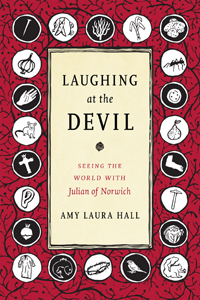 Amy Laura Hall, Laughing at the Devil: Seeing the World with Julian of Norwich (Durham: Duke University Press, 2018), 124pp.
Amy Laura Hall, Laughing at the Devil: Seeing the World with Julian of Norwich (Durham: Duke University Press, 2018), 124pp.
Her mother said that she asked too many questions. As a girl she had an insatiable desire to experience the love of God beyond the rituals of the church. She survived the plagues of 1349 and 1362 that decimated three-quarters of the population of Norwich on England's east coast. Then came her visions, "showings" or what she called her "ravings" during a period of sickness when she almost died. Although not a nun but a lay person who lived a "mixed life" in both the secular and sacred realms, she even had the temerity to ask the bishop to bless her plans to live as an anchoress in a tiny cell next to the church. He agreed, and so from there she read, prayed, dispensed spiritual wisdom, and for twenty years questioned and meditated upon her continuing visions.
Her ultimate act of audacity was not only to believe that God had truly spoken to her in her sixteen visions, and that the visions exceeded the limited wisdom of the church, but also that God intended for her to write them down in a "vernacular" book so that ordinary believers could benefit from them. This was the age of the Crusades, Chaucer, when John Wycliffe and the Lollards were martyred for religious transgression, the papal schism of 1378–1418, and a strictly enforced social hierarchy that greatly restricted the acceptable roles for women. Nonetheless, today Julian of Norwich (1342–1416) is best remembered for having written the first book composed by a woman in English, Revelations of Divine Love. How she and her manuscript ever survived is part mystery and part miracle.
Amy Laura Hall, a professor of ethics at Duke University Divinity School, began teaching a seminar on Julian in 1999, and says that she has become her personal "lodestar." Julian's basic message was both simple and radical. In one vision Jesus spoke to her, "Lo, how I love thee." In her introductory chapter Hall quotes Julian: "Though the three persons of the Trinity are all equal in themselves, my soul understood love most clearly, yes, and God wants us to consider and enjoy love in everything. And this is the knowledge of which we are most ignorant; for some of us believe that God is almighty and has power to do everything, and that he has wisdom and knows how to do everything, but that he is all love and is willing to do everything—there we stop."
Hall coins the word "omniamity" to describe this love of God. Her book is a mixed genre reading of Julian that is autobiographical, theological, and political. And so in one of my own favorite sayings, Julian advises us that "the greatest honor we can give almighty God is to live gladly because of the knowledge of his love."
Dan Clendenin: dan@journeywithjesus.net


